- Home
- Sarah Pinborough
The Language of Dying Page 2
The Language of Dying Read online
Page 2
Afterwards, Penny and I go downstairs and open a bottle of wine and eat more food, taking trays into the living room. There is toast and biscuits and cheese and ham and pickles and two tubes of Pringles and we scoff them as Eastenders plays out its drama in the background; the familiar voice of strangers a comfort, unreality soothing us for a while. We both continue to eat long after our hunger is gone and soon the bottle is nearly empty. My head is buzzing pleasantly, the world shimmering at the edges. I’m not a good drinker, not like Penny. But I think she’s a little drunk too. Her feet are up on the coffee table next to the surviving crumbs of our feast and her head lolls sideways against the brown leather.
‘I would have had him come and stay with me; you know that, don’t you, sweetheart? But with James being so little and the au pair living in, it would have been …’ Her petite shoulders shrug as if the rest of the sentence is so self-explanatory she needn’t waste her breath on the words. I’m tempted to say, It would have been what, Penny? Too hard? but I swallow my sharp tongue along with my sharp white wine, letting them both fizz angrily inside. I could say those words. And they would be true. It would have been too hard for Penny. And there’s the dry fact and no anger will change it and that’s why I stay quiet and keep my understanding silent. Different horses for different courses. You were always going to come here. Back home with the middle child. The pivot, the hinge between the normal of Paul and Penny and the strange, mad world of the boys; sometimes tilting this way and sometimes that. In both camps and yet neither.
Penny is still talking and making excuses that aren’t needed, but she needs to hear them out loud in order to believe. She talks and I find myself drifting. I’ve always drifted. Sometimes there are just too many words filling up the space and not enough emptiness left for thinking. I keep a little emptiness inside for when I need it. She’s off again. That’s what you used to say, way back when. Hey, Lady Penelope. Nudge your sister, she’s off again. And then you would laugh. In a world of her own, that one.
Time is surreal. I can hear that laugh as if it were yesterday and in the same instant I can see the years ahead in which I will never hear it again. I squeeze my eyes shut let the drifting take over.
They think I’m a dreamer, Paul and Penny. They think I don’t live in the real world, and maybe I don’t. Maybe I’ve avoided that, because if I cement myself too firmly in the here, then the thing outside the window, the thing in the field, will no longer exist. And if I were to allow that then it would be lost to me for good. I know this as surely as I know you are dying and that you are nearly lost to me for good. Nothing I can do will change that.
But, despite my empty thinking space, despite Penny and Paul’s sideways glances and rolled eyes over the years, it was only me who understood the seriousness of things a year back when your swallowing problems began. It was only me whose insides screeched with the knowledge of your life’s unravelling. It was only me who asked the questions and wanted to hear the answers. I can see the irony, even if they can’t. My own world is more real than theirs, even if I am lost in it. I don’t hide behind my cars and my clothes and my plumped-up lips.
Yes, you were always going to pack up your small flat and come back home. Because I think maybe you are a drifter too. We understand each other.
The silence breaks my thoughts and I realise that Penny has stopped talking and is looking at me, waiting for an answer. I have no idea what she has said and I know that she knows I’ve been gone in a world of my own, so I just smile and she smiles back. She runs one hand over my head gently, as if the four years between us are still a huge divide and she is still my big sister rather than a woman I once knew. But still, I am happy that she’s here. It’s a big warm rush coming out of me, like waters breaking and I look at her and think how I have envied her and hated her and avoided her over the years and yet here we are. Sisters again.
But then love clings on, doesn’t it, Dad? Even when by rights it has no place left to be, love is hard to kill. Like life. And sometimes, like life, it takes you completely by surprise.
*
There are enough bedrooms, but Penny and I choose to share one bed, enjoying this closeness that both of us are too afraid to mention in case it crumbles, its solidity unsure. The duvet is pulled up under our chins even though the room is too hot. The heating throbs through the pipes, gurgling like the slowing blood in your veins, both determined to keep you warm and alive for as long as possible. It won’t be long until my skin starts to itch with sweat, but I don’t mind. We are all cold in the end.
Penny is talking and I am determined not to drift, but to listen, to feel the glow that escapes with her words as she recalls incidents from so long ago. Lying there, we remember and laugh and it feels so good, mainly because I know that it will never be the same again. It is bittersweet. As you let go, so shall we. Buried in the scent of fresh sheets and the warmth of my sister, I store each second safely away so that I can savour this time in the years to come.
Still, tonight we talk about the old days and pretend they were as funny then as they are now. The times when you were really drinking hard, after Mum had gone and you had remarried and we were living through the ‘Shetland experience’ as Davey refers to it.
Yes, you were – are, not were yet – a drifter. Only a drifter would think it was a good idea to take five children and your new wife to the middle of nowhere and that it would pull you all together instead of ripping you apart. But then, if you pour vodka on your cornflakes every morning for four or five years, you’re going to have a lot of crazy ideas. A drinking drifter, that was you, our dad, way back when.
I don’t even know what Penny is trying to say, but we are laughing so hard I think I may wet myself. And then I spoil it.
‘I wonder if Dad can hear us laughing.’ The words come out with a giggle, but the sound is wrong. We quiet down after that, the atmosphere broken. I feel like we are in a bubble in the bed, a moment of alltime, not just then or now or in the time when you are no more, but all of it together, inseparable. For a while we say nothing, just listen to each other’s breathing and the rustle of eyelashes betraying wide-awake eyes.
It’s Penny who cracks the silence with her soft voice, but this time we don’t laugh. We talk about the night Mum left us. Not when she died, like you will soon, but when she just upped and left.
Penny sniffs a little, still recovering from all the belly laughing and I fight the urge to squeeze her tight. There, in the dark, the years have evaporated and she is just my big sister lying next to me, all natural and glowing and undamaged by life.
‘What happened to you that night?’ I can almost hear her brow furrowing in the sound of her voice. She’ll regret that, my empty thinking space says. More lines, more injections.
‘What do you mean?’ My eyes adjust to the dark and I make patterns out of the shadows and shapes of the plastered ceiling. I think it’s human nature, isn’t it? To look for patterns or meaning in things? That’s what Penny is doing now.
‘You were almost hysterical. We found you out in the field in the middle of the night. You must remember.’ She pauses, maybe doing a little drifting of her own, back to that night. ‘I woke up and you weren’t in bed. What made you go outside? You never said.’
‘I was ten, Penny.’ I state that as if it is enough, and maybe for Penny it is.
‘Were you looking for Mum? Did you think she’d change her mind and come back for us?’ Penny has found a pattern, a meaning that she can understand, and she keeps hold of it.
‘Probably. I don’t remember much about it.’
‘You are a funny one.’ Her voice is more settled. ‘Took hours to calm you down. You kept getting out of bed and going to the window.’
She sighs and we drift into our own worlds. Bubbles within bubbles. She has accepted my lie because it fits in easily, but it’s still a lie. I remember everything from the night our mother left. How could I forget? It was the first time I saw it. Lying here in the dark, in this moment of alltime, I le
t the memory run into my skin.
*
There are a lot of jazz records played in our house, it is the one tenuous bond Mum and you share beyond alcohol and the call of wild blood; a love of music that blares and dances and laughs like you do. Like you do in the good times. There’s a lot of jazz and a lot of rows and a lot of broken glass hidden amongst the books and the university papers and the vodka and wine bottles that make up your lives.
We are living in Surrey, in the house you inherited from your parents and which I will eventually buy from you. It’s large and untidy in a pleasantly middle-class way, but isn’t quite big enough for our ever-growing family and the piano and the various rabbits and hamsters we collect. We are a dysfunctional clutter of children who play within its walls when school is done. Paul, Penny, and gradually I, begin to suspect that although we speak as politely as the other children in our suburban grammar school, our home lives may not be quite as ordered as theirs. We don’t invite friends round and we decline invitations to tea. We do these things without consultation, each sibling owning their individual moment of revelation. My moment comes when you collect me from school one day. I am six, it is the seventies and things are ‘looser’, but even then all the other fathers either have their shirts tucked all the way in or hanging all the way out, their clothing delineating their political sway. Your shirt, though, is somewhere in-between, ignoring your politics. A bit of it is crumpled into the waistband of your trousers, but most of the back remains untucked like the boys at the big school wear them. I know that it’s wrong in a not-quite-right way and then I realise that is the same for everything in our family. Not-quite-right, not-quite-wrong. Too many cracks mar the surface.
I don’t look at the children and parents casting sly glances in our direction. Is he drunk? I can feel the hum of their whispers with every footfall. At least you are there to collect me while Mum sways to jazz in the garden and doesn’t work on her university thesis. You don’t leave us. You will never leave us.
Our mother loves babies and even as children we know this. She loves the touch and the smell of them. She loves their wriggling need and the way the crying stops when she wraps them to her thin chest. Of course we stop crying. Two parts breast-milk, one part raw spirit is what flows out of her and into us. She delights in babies, our mother, but not in motherhood. She has no interest in that. Children with minds of their own and a will separate to hers exhaust her. When we get to the foot-stamping age her love affair tires and it becomes time for another, fresher, smaller child to satisfy the aching place inside her only an infant can reach. Paul is the first to be discarded and then Penny, and then me.
By the time the boys come along things are falling apart for our parents and not even the joy of two temporary slaves to her breast can keep our mother with us. They disappoint her by quickly growing chubby limbs that support themselves. I think maybe they disappoint her more than we did. The boys rely on each other for play and comfort in that special way twins have that excludes all others. By the time they are coming up to five she starts to dislocate. She is still there, but she stares emptily at us as if wondering how on earth we all came to be. And it is you that makes the tea as best as you can and puts us all to bed.
Too often, too late at night, jazz is played too loudly to drown out slurring arguments that spark from nothing on the dry, dead twigs of our parents’ marriage. It becomes habit. Our middle-class bedtime lullaby.
Jazz is playing the night she finally leaves, when I am just two weeks into ten years old.
I am tucked up in my small bed, the covers almost all the way over my head. My bedside lamp is still switched on even though it must be gone ten. I think that Penny will turn it off, if she comes back to our room. We know that our parents will not be checking on us so Penny crept over to Paul’s room as soon as the volume was turned up; Miles Davis cheerfully trying to distract from the sounds of our parents’ war of selfloathing and mutual frustration. Two alcoholics staring at each other and not liking what they see, only a reflection of themselves, nothing better. Nothing worth loving.
Penny has started going into Paul’s room a lot and I know that they think I am too childish to share their talk and their games. Not as much of a baby as the boys but still not old enough to join in. There is just over a year between them and they are becoming their own branch on our family tree. They share knowing glances and giggling fits across the tea table. I feel lonely in my middle perspective, looking down at two who don’t need me and up at two who are too adult for me.
Tonight the music can’t drown out the rage and our mother shrieks her tantrum, all the words becoming one animal howl through the plaster of the ceiling. My heart is beating fast in my chest, discordant with the record and with the row. There are hot, wet tears on my cheeks, but I don’t sob. I pull the covers further up over my head and wish I could remember a song to sing myself. Something that isn’t jazz, that isn’t wild, but my head is empty. After a while of listening to the pounding thump of blood pushing round my body, feeling my own hot breath beneath the blanket that threatens to choke me, I realise that the sounds from below have stopped. Only the jazz is playing cheerfully on, uncaring about its silenced accompaniment.
I push my clammy face out into the light and listen. There is nothing below the music. The carpet is rough beneath my feet as I go carefully out into the hallway. Paul and Penny are sitting silently on the top stair. They look at me with their matching wide brown eyes.
‘I think Mum’s gone,’ Paul says. He is nearly sixteen and his unruly hair goes this way and that, like his voice that hasn’t quite broken. Paul isn’t broken yet either. Not yet damaged goods. Or maybe just a little.
Penny is holding his hand so tight that even in the gloom I can see where the blood is being squeezed aside. Her eyes are filling up, but to me she still looks beautiful.
‘I don’t think she’s coming back. She didn’t even say goodbye. She didn’t look up once.’
Paul hugs her and I say nothing, but my hands grip the sides of my polyester nightie and I pretend I am holding someone else and then, as my heart picks up the pace and sobs convulse my chest, you come up the stairs and sweep me off my feet, your warm tobacco smell enveloping me.
You take us into the boys’ room and talk. You talk a lot and none of it really means anything to me. You talk about guilt and blame and love and other things in the grey area we only understand in a black-or-white way, but we all know in our hearts that it’s our fault for not staying little for long enough.
Listening to you and seeing you try to be sober and try to give enough love for two and try to understand where it all went wrong, I wonder if you are too stuck in the grey to see the truth of our mother. Babies are wonderful, children tie you down. They make you old. And she has far too many of them. You blame yourself of course. And you will do for years to come. I think for all the years before you stop drinking.
Penny asks questions and cries and for a while Paul shouts at you and then the twins start to cry and we all sit silently. I yawn, suddenly wanting to be back in my bed and then everyone’s mouths stretch wide including yours, me the leader for once, and although there is emptiness inside all of us, the calm is good. The calm is very good. We go to bed, shuffling to our own corners of the house. The light goes off.
I can hear the clock ticking on the top of our shared chest of drawers. I listen to it until it fills my head and makes my ears hurt. I don’t sleep. My eyes are so heavy, but my heart is pounding and my head feels too hot. From Penny’s bed a few feet away, the sound of tears, of tears in her heart, has stopped and her hitching breath is now steady and slow. She doesn’t even twitch, so lost is she in sleep. Her body has shut down to close out the hard and let her start to recover. Gazing upwards in the dark I envy her. My body is storing the storm and I wish I could just let it out. My feet itch and, quietly pushing back the covers, I get out of bed, go to the window and kneel on the carpet. I slip my head under the curtains, goosebumps instantly app
earing on my skin as the temperature drops a couple of degrees, night air sneaking in through the tiny gaps around the sash window. Until Penny grew up and found Paul, we often snuck out of bed and came and rested our heads on this window ledge, giggling and making up stories of princesses and witches and happy endings.
Now, sitting on numbing ankles, the curtain feels like a shroud around my dying childhood and even in the chill my face gets hotter and hotter, burning me from the inside out. I wish I could cry; I wish Penny would come back from being a teenager and I wish Mum would come home and put everything back to not-quite-right. Something is building, bubbling in my stomach, flaring into white heat and I don’t know if it will explode out of me or whether it will meet with the dark spots at the edge of my vision and make me pass out. I want it to come out in words that I don’t have. I want it to make sense. To be not-just-mine. And then, as I am about to combust, it appears in the night. Out of nowhere.
There is a road between the end of our garden and the fields beyond. People drive too fast down it, eager to get to the next town – to other people and away from the quiet. At one a.m. though, it is silent and empty under the white light of the streetlamps, safe for hedgehogs and country mice to cross.
*
The creature in the middle of the road staring up at me isn’t one of these scurrying through the night. It stops my breath racing from my lungs as I stare in wonder. It wasn’t there a second before. There was nothing there but tarmac. And now here it is. Inside, the white fire I can’t control cools slightly. Below, on the cold road, its red eyes glow angrily and through the glass I can see hot steam charge from its flared nostrils as it paws the ground. I think perhaps it is blacker than the night, its mane shining as it is tossed this way and that. I am not sure whether it is beautiful or ugly, but I know that it’s wonderful. And I know that it’s waiting for me. One of my hands rises to the cold glass, as if by touching that I can reach the beast below. The lonely emptiness inside me fills up with something warm and thick. This creature and I belong together. I know it and so does he.

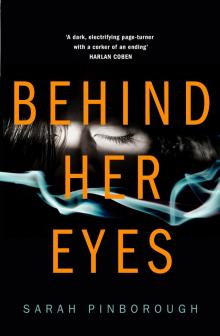 Behind Her Eyes
Behind Her Eyes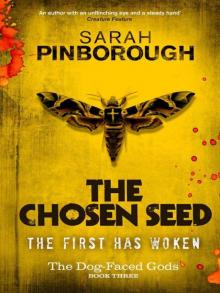 The Chosen Seed: The Dog-Faced Gods Book Three
The Chosen Seed: The Dog-Faced Gods Book Three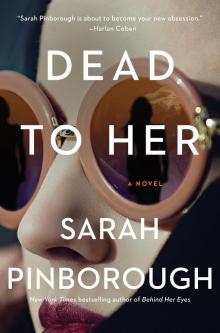 Dead to Her
Dead to Her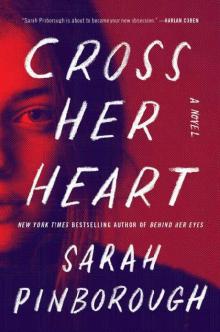 Cross Her Heart: A Novel
Cross Her Heart: A Novel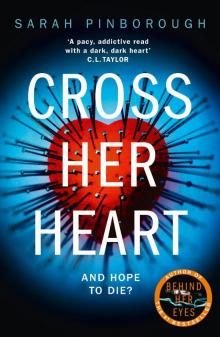 Cross Her Heart
Cross Her Heart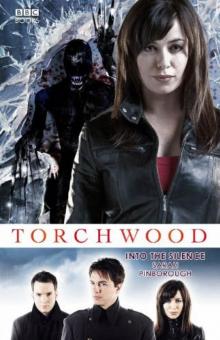 Into The Silence
Into The Silence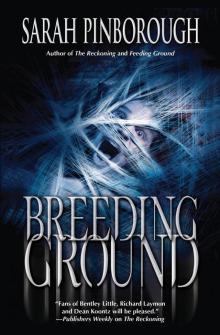 Breeding Ground
Breeding Ground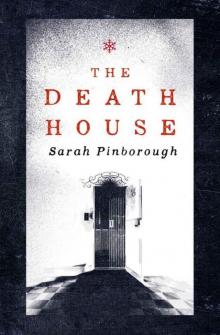 The Death House
The Death House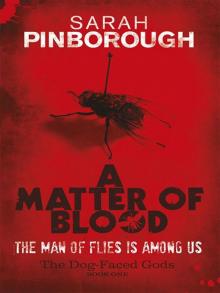 A Matter Of Blood (The Dog-Faced Gods Trilogy)
A Matter Of Blood (The Dog-Faced Gods Trilogy)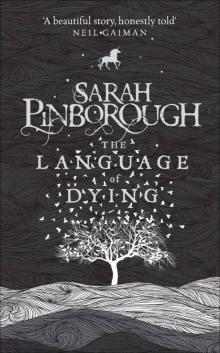 The Language of Dying
The Language of Dying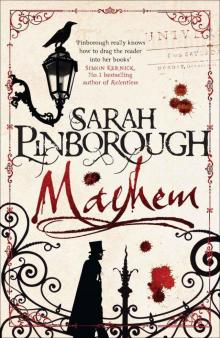 Mayhem
Mayhem Murder
Murder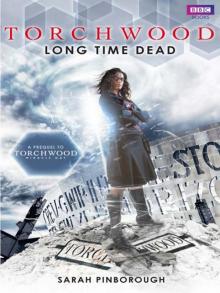 Torchwood_Long Time Dead
Torchwood_Long Time Dead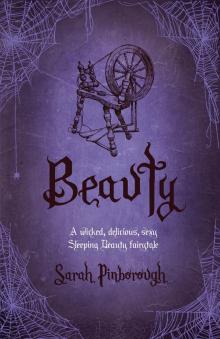 Beauty
Beauty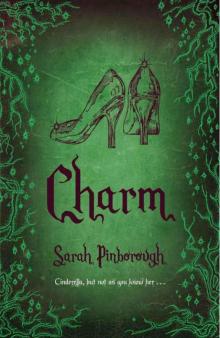 Charm
Charm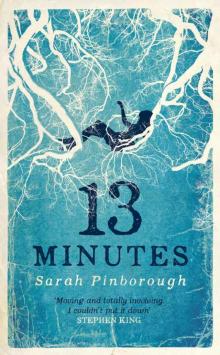 13 Minutes-9780575097407
13 Minutes-9780575097407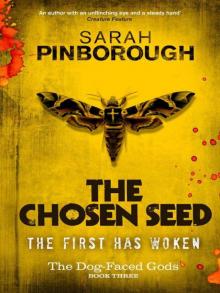 The Chosen Seed: The Dog-Faced Gods Book Three (DOG-FACED GODS TRILOGY)
The Chosen Seed: The Dog-Faced Gods Book Three (DOG-FACED GODS TRILOGY)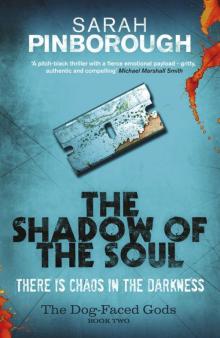 The Shadow of the Soul: The Dog-Faced Gods Book Two
The Shadow of the Soul: The Dog-Faced Gods Book Two Into the Silence t-10
Into the Silence t-10